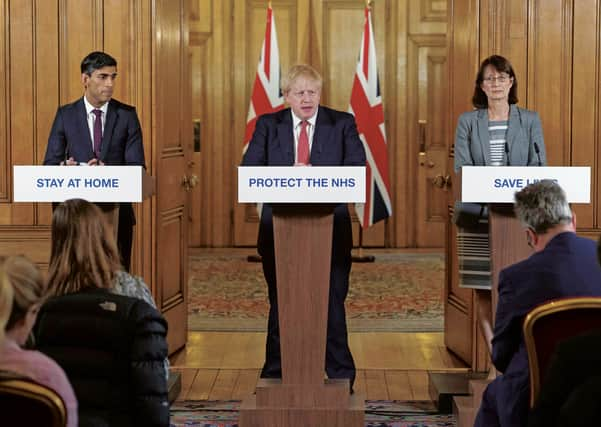Euan McColm: Virus can’t kill politics, but it will never be the same again


We’ve been obsessed with constitutional rearrangement, with a magic button politics that says the break-up of the United Kingdom or departure from the European Union will solve all manner of problems.
For years now, the political chancer has been on the rise; hucksters preying on post-financial crash anger and insecurity have conned their way to the top. Under their influence, our politics has been angry, divided and profoundly unserious.
Advertisement
Hide AdAdvertisement
Hide AdAs the UK braces itself for the full impact of the coronavirus pandemic, our recent political debate has never looked so small.
If this is true, then it is also true that our leaders have never looked so impressive.
First Minister Nicola Sturgeon, in recent years an increasingly divisive figure, has been calm and authoritative, a reassuring presence at the head of the Scottish Government.
For those of us who hold Prime Minister Boris Johnson in contempt, it is unsettling to have to admit that, yes, he too has risen to the occasion.
On Friday, Chancellor Rishi Sunak announced a series of measures of unprecedented size to ensure as many jobs as possible are protected in the difficult months to come. His promise that the government will cover 80 per cent of the salaries of those whose jobs are threatened is the sort of thing that Tory MPs would have dismissed as magic money tree fantasy just a few weeks ago.
Sunak was impressive as he outlined his new budgetary plans. Social media was full of remarks along the lines that the Chancellor was the real statesman, that he made Johnson look inept. Even Labour and SNP MPs found themselves praising Sunak’s bold action.
I’m bound to point out that, when Sunak was appointed as Sajid Javid’s replacement five weeks ago, the consensus was that Johnson had put in position a yes man who would do as he was told. Javid had quit after refusing to follow the PM’s instruction to sack his team of advisers. Sunak was the eager-to-please new boy who would do as he was instructed.
Those who held this view – and I include myself among them – can hardly turn round now and say the Chancellor is leading the PM when it comes to the response to coronavirus.
Advertisement
Hide AdAdvertisement
Hide AdPainful though it may be to concede the point, if Sunak deserves praise for the government’s financial plans then so, surely, does Johnson.
Having announced that plans for a second independence referendum are on hold, the SNP has, effectively, called a halt to hostilities between the Scottish and UK governments.
After a petty and unseemly spat 10 days ago, when UK government sources attacked Sturgeon for speaking publicly about a Cobra meeting, unity has been achieved. The UK and Scottish Governments are working together, political opponents are treating each other with respect, discussing the issues at hand in good faith.
There are, say some SNP sources, political risks for the independence movement in the way the two governments are cooperating. One veteran campaigner makes the point that the nationalists’ narrative is that the UK holds Scotland back and that a reality in which the Chancellor of the Exchequer steps in to save thousands of Scottish jobs doesn’t sit well. It’s not, he adds, that he thinks the Scottish and UK governments shouldn’t be working closely, just that he recognises a potential consequence.
There are areas where both governments should do more.
Sunak’s announcement on Friday will have reassured those who are in regular employment but there was nothing there for the self-employed, for the millions of freelancers whose lives stand to be every bit as disrupted by the virus.
Many key workers on whom we will all, increasingly, depend in the weeks to come require public transport to get to their places of employment. Sturgeon should step in here and see that trains are available when vital shift workers need them.
The current crisis may be unprecedented but recent years have churned with turbulence. If Johnson is wise, he will turn to those who led through previous difficult times for advice.
An advisory council including former prime ministers from John Major through to Theresa May, former chancellors Alistair Darling, Ken Clarke, and George Osborne, along with senior figures from all political parties should be convened and policy ideas proposed and tested.
Advertisement
Hide AdAdvertisement
Hide AdIf Johnson does not proceed with something along these lines, Sturgeon should. The public would, I think, find the existence of such a body reassuring.
Politicians may say that now is not the time for politics but politics is perpetual and, at some point, there will be a judgment to be made on leadership. Voters will look most kindly on those who placed cooperation over conflict.
It was not just the practical steps Sunak outlined on Friday that had real impact. It was striking that he chose to talk about the crisis in terms of morality.
“When this is over, and it will be over,” he said, “we want to look back on this moment and remember the many small acts of kindness, done by us and to us.
“We want to look back on this time and remember how, in the face of a generation-defining moment, we undertook a collective national effort and we stood together.”
This, I think, was note perfect. Prime ministerial, even.
And so we plough on into an uncertain future. The rules of politics have changed so that, for now, the success of those in power is in the interests of those in opposition.
Boris Johnson and Nicola Sturgeon, until recently the bitterest of foes, are now a team with a single objective.
I wonder whether, when we come through this crisis, as we surely will, the arguments that once dominated our politics will seem so important.
Comments
Want to join the conversation? Please or to comment on this article.